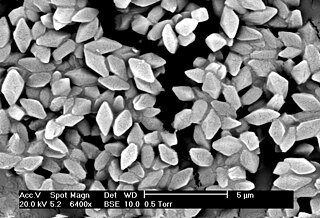
Bacillus thuringiensis is a gram-positive, soil-dwelling bacterium, the most commonly used biological pesticide worldwide. B. thuringiensis also occurs naturally in the gut of caterpillars of various types of moths and butterflies, as well on leaf surfaces, aquatic environments, animal feces, insect-rich environments, flour mills and grain-storage facilities. It has also been observed to parasitize moths such as Cadra calidella—in laboratory experiments working with C. calidella, many of the moths were diseased due to this parasite.

Cotton is a soft, fluffy staple fiber that grows in a boll, or protective case, around the seeds of the cotton plants of the genus Gossypium in the mallow family Malvaceae. The fiber is almost pure cellulose, and can contain minor percentages of waxes, fats, pectins, and water. Under natural conditions, the cotton bolls will increase the dispersal of the seeds.

Vandana Shiva is an Indian scholar, environmental activist, food sovereignty advocate, ecofeminist and anti-globalization author. Based in Delhi, Shiva has written more than 20 books. She is often referred to as "Gandhi of grain" for her activism associated with the anti-GMO movement.
The Monsanto Company was an American agrochemical and agricultural biotechnology corporation founded in 1901 and headquartered in Creve Coeur, Missouri. Monsanto's best-known product is Roundup, a glyphosate-based herbicide, developed in the 1970s. Later, the company became a major producer of genetically engineered crops. In 2018, the company ranked 199th on the Fortune 500 of the largest United States corporations by revenue.

Genetically modified crops are plants used in agriculture, the DNA of which has been modified using genetic engineering methods. Plant genomes can be engineered by physical methods or by use of Agrobacterium for the delivery of sequences hosted in T-DNA binary vectors. In most cases, the aim is to introduce a new trait to the plant which does not occur naturally in the species. Examples in food crops include resistance to certain pests, diseases, environmental conditions, reduction of spoilage, resistance to chemical treatments, or improving the nutrient profile of the crop. Examples in non-food crops include production of pharmaceutical agents, biofuels, and other industrially useful goods, as well as for bioremediation.

Pioneer Hi-Bred International, Inc. is a U.S.-based producer of seeds for agriculture. They are a major producer of genetically modified crops with insect and herbicide resistance.
Bt cotton is a genetically modified pest resistant plant cotton variety that produces an insecticide to combat bollworm.
Farmers' suicides in India refers to the event of farmers dying by suicide in India since the 1970s, due to their inability to repay loans mostly taken from private landlords and banks. India being an agrarian country with around 70% of its rural population depending directly or indirectly upon agriculture, the sector had a 15% share in the economy of India in 2023, and according to NSSO, around 45.5% of country's labor force was associated with agriculture in 2022. Activists and scholars have offered several conflicting reasons for farmer suicides, such as anti-farmer laws, high debt burdens, poor government policies, corruption in subsidies, crop failure, mental health, personal issues and family problems.

Genetically modified food controversies are disputes over the use of foods and other goods derived from genetically modified crops instead of conventional crops, and other uses of genetic engineering in food production. The disputes involve consumers, farmers, biotechnology companies, governmental regulators, non-governmental organizations, and scientists. The key areas of controversy related to genetically modified food are whether such food should be labeled, the role of government regulators, the objectivity of scientific research and publication, the effect of genetically modified crops on health and the environment, the effect on pesticide resistance, the impact of such crops for farmers, and the role of the crops in feeding the world population. In addition, products derived from GMO organisms play a role in the production of ethanol fuels and pharmaceuticals.

China Blue is a 2005 documentary film directed by Micha Peled. It follows the life of Jasmine Li, a seventeen-year-old worker from Sichuan province, in a Chinese jeans factory, Lifeng Clothes Factory (丽锋服饰制衣有限公司) in Shaxi, Guangdong producing Vigaze Jeans, hence the title. Jasmine earned about half a yuan for one hour's work.

The Green Revolution was a period that began in the 1960s during which agriculture in India was converted into a modern industrial system by the adoption of technology, such as the use of high yielding variety (HYV) seeds, mechanized farm tools, irrigation facilities, pesticides, and fertilizers. Mainly led by agricultural scientist M. S. Swaminathan in India, this period was part of the larger Green Revolution endeavor initiated by Norman Borlaug, which leveraged agricultural research and technology to increase agricultural productivity in the developing world. Varieties or strains of crops can be selected by breeding for various useful characteristics such as disease resistance, response to fertilizers, product quality and high yields.

SmartStax is a brand of genetically modified seed made through a collaboration between Monsanto Company and Dow Chemical Company. It takes advantage of multiple modes of insect protection and herbicide tolerance. SmartStax takes advantage of Yieldgard VT Triple (Monsanto), Herculex Xtra (Dow), RoundUp Ready 2 (Monsanto), and Liberty Link (Dow). The traits included protect against above-ground insects, below-ground insects, and provide broad herbicide tolerance. It is currently available for corn, but cotton, soybean, and specialty crop variations are to be released. Previously, the most genes artificially added to a single plant was three, but Smartstax includes eight. Smartstax also incorporates Monsanto's Acceleron Seed Treatment System which protects against insects at the earliest stages of development. Smartstax is sold under the Genuity (Monsanto) and Mycogen (Dow) brands.
The genetically modified brinjal is a suite of transgenic brinjals created by inserting a crystal protein gene (Cry1Ac) from the soil bacterium Bacillus thuringiensis into the genome of various brinjal cultivars. The insertion of the gene, along with other genetic elements such as promoters, terminators and an antibiotic resistance marker gene into the brinjal plant is accomplished using Agrobacterium-mediated genetic transformation. The Bt brinjal has been developed to give resistance against lepidopteron insects, in particular, the Brinjal Fruit and Shoot Borer (FSB) by forming pores in the digestive system. Mahyco, an Indian seed company based in Jalna, Maharashtra, has developed the Bt brinjal.
The Center for Food Safety (CFS) is a 501(c)(3), U.S. non-profit advocacy organization, based in Washington, D.C. It maintains an office in San Francisco, California, and Portland, Oregon. CFS's mission is to empower people, support farmers, and protect the earth from the harmful impacts of industrial agriculture through groundbreaking legal, scientific, and grassroots action. It was founded in 1997.
Genetic engineering in Hawaii is a hotly contested political topic. The Hawaiian Islands counties of Kauai, Hawaii and Maui passed or considered laws restricting the practice within their borders due to concerns about the health, the environment and impacts on conventional and organic agriculture.

GMO OMG is a 2013 American pseudoscientific documentary film which takes a negative view towards the use of genetically modified organisms used in the production of food, in the United States. The film focuses on Monsanto, a multinational agrochemical and agricultural biotechnology corporation, and their role in the food industry alongside the effects of GMOs and how they are generated.
A genetically modified sugar beet is a sugar beet that has been genetically engineered by the direct modification of its genome using biotechnology. Commercialized GM sugar beets make use of a glyphosate-resistance modification developed by Monsanto and KWS Saat. These glyphosate-resistant beets, also called 'Roundup Ready' sugar beets, were developed by 2000, but not commercialized until 2007. For international trade, sugar beets have a Maximum Residue Limit of glyphosate of 15 mg/Kg at harvest. As of 2016, GMO sugar beets are grown in the United States and Canada. In the United States, they play an important role in domestic sugar production. Studies have concluded the sugar from glyphosate-resistant sugar beets is molecularly identical to and so has the same nutritional value as sugar from conventional (non-GMO) sugar beets.
Maharashtra Hybrid Seeds Co. (Mahyco) is an agricultural company based in India and a major producer of seeds. As of 2015, the company also operates in Vietnam, Indonesia, Philippines and Bangladesh, with plans for expansion into Africa. The company produces seeds for cotton, wheat, rice, sorghum, pearl millet, maize oilseeds and vegetables crops. Through a joint venture with Monsanto named Mahyco Monsanto Biotech, Mahyco sublicenses Bt cotton technology in India. The Indian government has maintained price controls on Bt cotton seeds since at least 2011.

Store Wars: When Wal-Mart Comes to Town is a documentary based on true story, directed by filmmaker Micha Peled. The movie was released on October 2, 2001. It is Peled's second documentary after Will My Mother Go Back to Berlin?(1993). It is the part one of Peled's Globalization Trilogy where the other two films of the trilogy are China Blue(2005) and Bitter Seeds (2011). The film's music was directed by Pete Sears and the cinematography was taken care by Allen Moore. It was premiered in South by Southwest Film Festival in 2001. The documentary won CINE Golden Eagle Awards and Golden Gate award in San Francisco International Film Festival.
Micha X. Peled or Micha Peled is a San Francisco based Israeli film maker. He is known for his Globalization Trilogy, a series of three films including Store Wars: When Wal-Mart Comes to Town,China Blue and Bitter Seeds.










